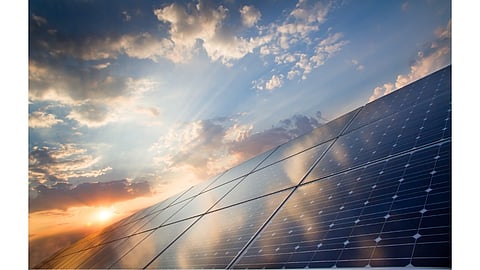

Higher temperatures can boost PEC-based solar-plus-storage system performance by accelerating ion transport and electrolyte conductivity
Researchers found a performance ‘sweet spot’ around 45°C before gains plateaued with further heating
This hints at the possibility of reducing cooling needs, cutting costs, and aiding hot-climate solar adoption and system resilience
A recent study indicates that higher temperatures may actually boost the performance of next-generation solar-plus-storage systems, challenging the traditional belief that heat undermines solar efficiency.
Findings from the UK’s Loughborough University study are based on the use of photoelectrochemical (PEC) flow cells, which integrate the solar harvesting ability of a solar panel with the storage power of a battery-integrated storage.
“Instead of fighting against the sun’s heat, our research shows we can harness it,” said Loughborough University’s Dr. Dowon Bae and the Lead Author of the study. “It flips the conventional wisdom on its head and gives us a new way to design solar storage systems that thrive in hot conditions.”
The researchers conducted photoelectrochemical voltammetry and impedance spectroscopy tests using a single-junction c-Si immersed in a photoelectrode placed in Fe(CN)6³⁻/⁴⁻ solution under heat, to study how temperature affects the thermo-electrochemical performance of silicon-based PEC cells. As the device heated up, the electrochemical current increased due to faster ion transport and enhanced electrolyte conductivity.
They identified a ‘sweet spot’ around 45°C where they found performance gains were the strongest before starting to plateau.
According to their findings, harnessing heat to accelerate ion movement and conductivity in the electrolyte could offer a more efficient and resilient pathway for integrating solar power and storage in hot climates.
Additionally, it can guide the design of future solar devices that deliberately operate at warmer temperatures and can lower costs by reducing the need for cooling systems. Such a scenario will benefit countries with abundant solar resources and high ambient temperatures the most, according to the team.
However, while the research shows that higher temperatures can speed up energy storage reactions, they also reduce the voltage output of the system in a linear fashion, thus offsetting the gain obtained from the increase in operating temperature.
To overcome these challenges, scientists suggest using PEC device materials that are less sensitive to heat, such as those with a wider bandgap, and choosing chemical mixes that can balance out the voltage drop at high temperatures, making the technology more effective in hot conditions.
“So, instead of fighting against the heat, engineers can now use it to their advantage, creating more efficient solar energy storage solutions. By understanding and harnessing this hidden effect, we can ultimately make integrated solar technology a more viable option for powering our world,” added Bae.
Titled Temperature impact on thermo-electrochemical behavior of silicon-based photoelectrochemical flow cells, the study published in The Journal of Chemical Physics can be downloaded for free here. It was funded and supported by the Engineering and Physical Sciences Research Council of the UK.
